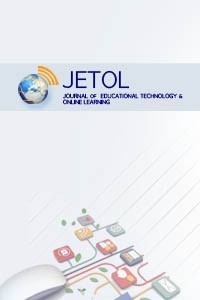New approaches on education technologies: A global perspective for digital transformation
New approaches on education technologies: A global perspective for digital transformation
change, innovation, technology adoption global impact,
___
- Florida, R., Mellander, C., and King, K. (2015). The 2015 Global Creativity Index (2015). Martin Prosperity Institute, Rotman School of Management, University of Toronto. Retrieved from: http://www-2.rotman.utoronto.ca/mpi/wp-content/uploads/2015/07/GCI-2015-Insight_The-2015-Global-Creativity-Index.pdf
- World Economic Forum and The Boston Consulting Group (2015). New Vision for Education: Unlocking the Potential of Technology. Geneva.
- https://en.wikipedia.org/wiki/21st_century_skills#Common_Core
- ISSN: 2618-6586
- Yayın Aralığı: Yılda 3 Sayı
- Başlangıç: 2017
- Yayıncı: Gürhan DURAK
Mutlu Tahsin ÜSTÜNDAĞ, Ebru SOLMAZ, Seher ÖZCAN
Yusuf CAN, Mehmet Akif AKSOY, Esra AKSOY, Serkan NARLI
İrem Gizem ACAR, Filiz DİKKARTIN ÖVEZ
Mobile learning in grades K–12: A literature review
Esma ÇUKURBAŞI ÇALIŞIR, Fırat Hayyam SABUNCU, Tarık KIŞLA
An examination of opinions of teacher candidates on a course enriched through gamification
The effects of Covid-19 on mathematics learning areas
Aziz İLHAN, Hafize Gamze KIRMIZIGÜL
Investigating the digital skills of undergraduate students in terms of various variables
